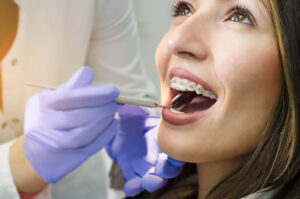If you’re asking the question, you’re likely a teenager hoping the answer is “no” or an adult who wonders if it makes sense at this stage in the game. Orthodontic work is an investment. As with any investment, you should analyze the cost/benefit ratio… and seek the advice of a professional. This article addresses a handful of questions people raise when considering whether or not to get braces. While these discussions may not offer a definitive answer to your question, they will give you some things to think about and ask an orthodontist when you do reach out.
Won’t my teeth straighten themselves eventually?
Our bones (teeth included) shift throughout our lives. There may be some natural movement as you get older that could be mistaken for “straightening,” but to assume teeth will straighten themselves is akin to believing that chaos will naturally become ordered. It’s just not usually the case. Your teeth sit where they are because of a variety of factors, any of which can change over time. In short, your teeth have a very small chance of possibly straightening over time and a much greater chance of becoming more crooked.
Additionally, it’s important to note that orthodontic work addresses more than cosmetic issues. It also helps with chewing, speech, and balancing the skeletal structure of the face.
But my teeth look straight
There is more going on in your mouth that what can be seen with the naked eye. Your teeth could look straight to the average passerby, but there could be significant bite or jaw alignment issues. People can’t see the direction of the roots of the teeth without x-rays, and a doctor needs to review the dental occlusion (how your upper and lower teeth sit together).
The field of orthodontics addresses four things related to your mouth: your smile, your bite, how you chew, and how you speak. Your smile relates to how your teeth look, whether they are properly aligned. Your bite is more about how your jaws work together. How you chew is significantly impacted by your occlusion. Finally, your speech is impacted by the way your tongue interacts with your teeth. This is why individuals with a gap between their teeth often speak with a lisp.
Conditions like TMJ dysfunction can lead to pain, difficulty chewing, or a locking of the jaw. One of the causes of TMJ is an improper bite. This means your upper teeth and lower teeth don’t meet properly when you chew, forcing the jaw to make adjustments it wasn’t designed to make.
How habits and patterns of living affect teeth alignment
Some orthodontic issues are natural while others are environmental. Obviously, any kind of jaw injury or mouth trauma could create a need for orthodontic treatment, but less violent incidents and lifestyles can be culprits as well.
Mouth breathing
Whether it’s the result of a deviated septum, chronic allergies, or some other reason, mouth breathing can cause teeth to move out of alignment. Sometimes the movement causes a gap. Other times the constant force of inhaling through the mouth can push the teeth back into a V.
Thumb sucking
It’s not uncommon to see children who suck their thumb with more of an overjet than those who do not. Often, parents don’t express any concern because they rationalize that the baby teeth will fall out anyway. However, what they may have failed to consider is that the jaw itself could have shifted as a result of the habit, a shift that lasts well into adolescence or adulthood if left untreated.
Reed instruments
Similar to thumb suckers, individuals who spend a notable amount of time playing reed instruments may notice the development of an overjet due to the pressure of the instrument on the upper jaw (known as the maxilla). Unlike with thumb suckers, orthodontists will not encourage you to quit playing, but they will offer some suggestions that will benefit the longevity of your ability to play without long-term adverse effects.
Teeth grinding/jaw clinching
Many people wake up in the morning with sore jaws because they’ve clenched them or ground their teeth in their sleep. This could be a stress response. Regardless of the cause, it can have long term effects on your bite if left untreated.
Why do some people have to get braces more than once?
Reasons for having to get braces more than once could range from slow dental development to poor orthodontic aftercare and a myriad of things in between. In other words, an orthodontist may choose to begin treatment on the existing baby and permanent teeth rather than waiting on all of the baby teeth to fall out before beginning. Other cases could be the result of a patient not wearing the retainer properly after braces are removed, causing teeth to return to a pre-treatment positioning. If an orthodontist recommends a second round of braces, it’s not because they are trying to take your money; it’s because doing so is a treatment means of achieving the optimal result.
It may be obvious to you when you look in the mirror whether or not braces could improve your smile. However, it’s what you don’t see that may be the primary reason you need braces. The only way to know for sure is to consult with an orthodontist









